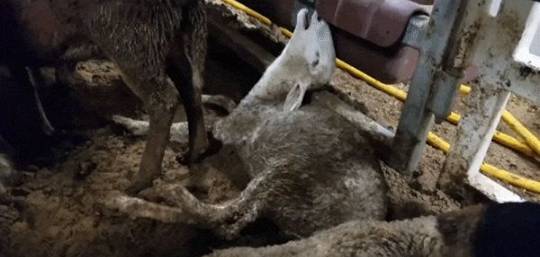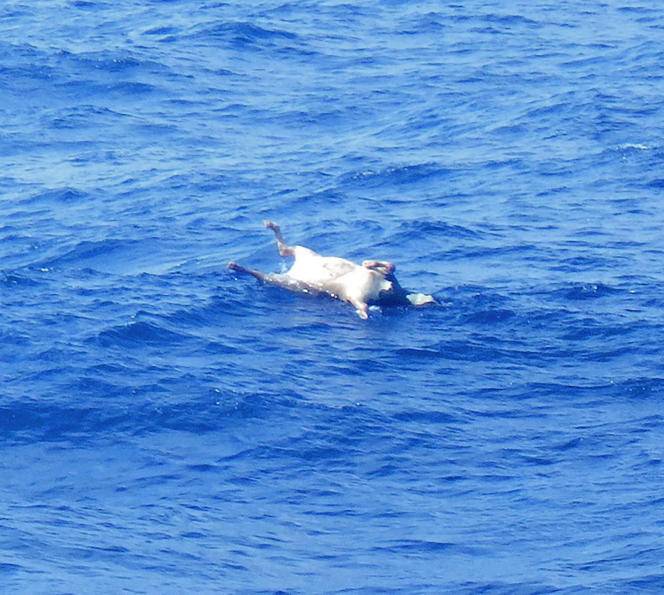
On August 29, 1996, the MV UNICEB, a 20,884 tonne livestock cargo ship caught fire on the sixth day of its voyage from Australia to Jordan. 67,488 sheep will suffer a horrible death, by fire or by drowning, in the middle of the Indian Ocean.
In 2020, the Gulf Livestock, another livestock cargo ship, was wrecked in the East China Sea due to a typhoon. On board, 5,800 cows will drown. A year earlier, the same ship, loaded with animals, had wandered in the open sea for twenty-five hours due to engine damage.

On December 18, 2020, the cattle truck Karim Allah left Cartagena to go to Turkey. 895 calves are part of the trip. For unknown reasons, the ship's captain was not granted permission to dock in port. He must make a U-turn towards his port of departure. All the animals will be euthanized upon their arrival. Indeed, the legislation provides that any animal that has left European waters cannot be reimported. A witness, present when the herd arrived, reports that the slaughter was carried out in red containers lined up on the docks of the port of Cartagena.
On March 18, 2021, The Elbeik ship returns to the same port of Cartagena. He, too, was never able to reach his port of destination. No permission to dock. The boat roamed the Turkish, Cypriot, Egyptian and Italian coasts with nearly 1,800 cattle on board. Left on December 18, 2020 and after three months of a traumatic crossing, he presents himself with the holds filled with animals in very poor condition, 180 of which have died in certainly appalling conditions. According to the testimony of Adeline Colonat, from the NGO Welfarm: “The animals look in a bad state. They are piled up in their urine and feces. We see that they are at the end of the race ” . Chances are great that they will be slaughtered and go to rendering.
All these facts are not diverse. They are just a few terrifying examples of an unacceptable reality devoid of any humanity that everyone should know.
The European Union exports each year more than 3 million cattle and sheep by sea to third countries, mainly in the Middle East, where they reach fattening centers or slaughterhouses. A report published in May 2020 on the welfare of animals exported to the sea showed that the European Commission recognized major shortcomings in the regulation of this sector: “Currently, neither the Member States nor the Commission have any information or statistics on the state of health and welfare of animals during sea voyages ”. And Adeline Colonat added: “As soon as the animals leave European ports, everything is out of control. "
I find, in fact, the word "gap" extremely well chosen to explain the suffering of a living being!
Even if many countries have undertaken to legislate in favor of the animal condition and to harden their arsenal to fight against abuse, there remain sectors in which opacity is still required.
This latest tragedy at sea has put the spotlight back on an activity where legislative vagueness still reigns. The regulations are few, little up to date and in any case, little respected.
In France, for example, two texts are in force to regulate the protection of animals during transport:
- Council Regulation (EC) n ° 1/2005 of 22 December 2004 on the protection of animals during transport and related operations
- The Rural and Maritime Fisheries Code (CRPM), Article L.214-12 (Legislative part) and R.214-49 to 62 (Regulatory part).
Let us remember, for all practical purposes, that these regulations, supposed to protect farm animals, recognize their sensitivity, namely their capacity to feel pleasure, suffering and emotions.
Article L124 of the rural code (codification of a law of 1976), for its part, mentions their character as sentient beings. And the Civil Code to specify, in 2015, that animals are beings endowed with sensitivity but remain subject to the property regime! I leave it to the reader to give the adjective he likes to qualify these provisions and those who have adopted them.
Even better. A recent regulation provides that "before departure, the driver assesses the fitness of animals for transport, he checks that they are correctly identified and in good health. Wounded or weak animals are not considered fit ”. Fit to die is understood.
However, in the face of this display of stupidity, horror and inhumanity, there are advances which should not be missed . Let's name a few around the world :
- The PACT Act (Preventing Animal Cruelty and Torture Act) adopted by Donald Trump on November 25, 2019.
- The Lucy's Law of the Johnson government in Great Britain in 2020
- The first Directorate of Animal Protection in Spain in 2020
- The Law against Animal Mistreatment in France and the announcement made on January 29, 2020 by the Minister of Agriculture and Food of new measures for the protection and improvement of animal welfare.
There are others of course, and that's great. But they should not mask the horrors that are still unfolding. They have no limits or borders. On the other side of the earth, the Animals Australia association broadcast, a few months ago, a report with perfectly unbearable images thanks to which a ship was immobilized in an Australian port bound for the Middle East. What follows is thrilling. The boat was carrying 50,000 live sheep. The animals are crammed into the different levels. They are forced to stand for weeks, in the suffocating atmosphere of their poorly ventilated and too hot enclosures , and when they no longer have the strength to survive in these conditions, they die in their excrement . The ammonia in their faeces makes the air unbreathable, burns the airways and eyes, and panicked animals quickly overheat and suffer amid the corpses of their companions. Faisal Ullah, a graduate of the Pakistan Marine Academy and author of the videos, said: “ They were dying before our eyes. […] One by one, one after the other, it was like putting living animals in the oven ”. He continues his terrible story by describing the fate of the lambs: “gravid females, theoretically prohibited for export, who gave birth to lambs that died and were thrown overboard. "
How many shipwrecks and additional reporting will it take to put an end to this barbarism? How many "legislative gaps" will all of its animals have to endure before they can hope to live their last days with dignity? It is demeaning us to the lowest to treat them like this. The animal condition does not stop at the shops or the pet stores in front of which we are so touched by the pretty faces of the puppies and the cats. It is also found in the holds of boats, on the oceans very far from where we live. Certainly, sheep and cattle of all kinds will be killed and will end up on our plates. But is it essential to add cruelty to murder? Isn't the killing in itself terrifying enough without having to match it with ignominy?
Posted on 2021-03-21 16:53








Comments